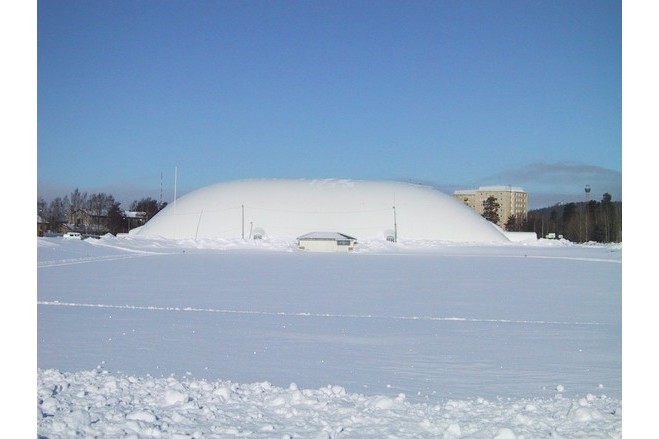Bubbles in the snow - Snow Castle
General information
-
Home page
http://www.tensotech.com
-
Location address
Kemi
-
Location country
Finland
-
Function of building
Shelters
-
Degree of enclosure
Fully enclosed structure
-
Climatic zone
Polar - very cold and dry all year
-
Number of layers
mono-layer
-
Type of application of the membrane
internal
Description
In northern Finland we usually have a lot of snow. Not in an excessive way that we are forced to use it for our buildings like Inuits make their igloos, but more in a playful way that we can have fun with it. In the early days of the air halls some people were testing pneumatic structures as a mould for concrete and different resin-based materials.
In Finland, in a northern city called Kemi (www.snowcastle.net), some people got the idea to build the biggest snow castle in the world. In Sweden they already had built structures from ice but not from snow.
Figure 1 A two-storey snow hotel covered with the sow (reception in the centre, 8 rooms around)
Figure 2a, 2b Internal views of the snow hotel
The first moulds were made by combining plywood with timber or steel, but off course double curved forms were difficult to accomplish.
Our long-time client (www.mailari.fi), renting big tents for all kind of summer festivals, asked us to build moulds for making small igloos.
The biggest problem with moulds using air pressure has always been how to fix them to the ground, because of the size the inner pressure has to be up to 4-5 kPa to resist the weight of the packed snow against the walls. On the other hand the moulds should be easy to move and handle to meet commercial demands. Some experiments seemed promising, showing that the structure could be built in 10 minutes and was a closed volume with a demountable bottom. The smallest ones can be carried by two men having the full pressure inside. The pressure stiffens the whole structure with its bottom.
The first prototype measured 6m x 4m (diameter x height), later adding 8 smaller ones of size 3.5m x 2.3m. The biggest one we made was 12m x 8.5m and next winter we have planned to build one of size 16m x 11m. The most difficult thing is how to make snow that is structurally stable enough, not how to make the mould itself.
Anyway, those are small compared to the sport halls we have made in Finland: there are two halls for football training, size 120m x 68m x 21m and for the next winter we have planned one of size 180m x 72m x 22m. Because of the Finnish weather conditions these membranes are always manufactured in one single piece: this is the traditional Finnish way not found in any other country.
Figure 3 Airhall of 100m x 60m x 18m
Figure 4 Airhall of 95m x 55m x 16m
The Finnish climate has always been suitable for air halls and the number of built structures has risen to more than 500 in fourty years which is a lot for a small country.
Finland is also exporting a lot of steel framed PVC-covered structures all around the world. (www.besthall.com).
Description of the environmental conditions
Material of the cover
Main dimensions and form
Duration of use
Editor
-
Editor
Marijke M. Mollaert



